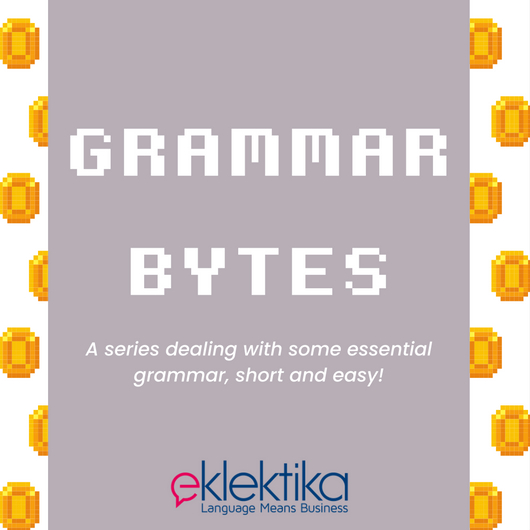
This new series will focus on the subject that makes learning a new language a bit harder, grammar! We have all said at one point or another “I want to learn to speak and focus less on grammar” but the ugly truth is, grammar is just as important for speaking as it is for writing. That’s why we decided to give you some “bytes” of it through this series.
“Auxiliary verbs”
What are auxiliary verbs?
They’re needed to form sentences in different tenses. The main auxiliary verbs are the verb to be, to do and to have.
How do they work?
Depending on which tense you are trying to create they can take different forms.
- To do: This auxiliary verb is necessary to: ask questions in the present and past simple tenses (all of its forms: do/does/did).
Ex: Katherine works at PWC ->Does Katherine work at PWC?
Jillian lived in London -> Did Jillian live in London?
Negative sentences -> I don’t like that movie.
- To be: it is necessary to create present and past continuous sentences as well as in the passive forms.
Ex: Computers are made by American companies based in Asia.
Newspapers are disappearing at an alarming rate.
His happiness was envied by many.
- To have: it is necessary to create present and past perfect tenses (all of its forms have/has/had).
Ex: Karol and Jan have worked at Eklektika for 10 years -> Have they worked at Eklektika for 10 years?
Note: Some tenses (like present perfect continuous) need more than one auxiliary!
Ex: They have been working for 2 hours.
- To contract or not to contract?
Contractions are a very fundamental part of spoken English. It is possible to contract the auxiliaries to make communication flow faster.
Example:
I’m reading that book-> instead of->I am reading that book
However, for more formal writing it is not encouraged to use contractions.
Example:
The shipment is arriving tomorrow->instead of->The shipment’s arriving tomorrow
Form
| Positive Contraction | Negative Contraction | |
Do/Does | None | I don’t like it You don’t enjoy it He doesn’t work here She doesn’t speak English It doesn’t work They don’t understand You don’t look well We don’t travel often |
To be | I’m bored You’re nice He’s tall She’s lovely It’s late They’re trying You’re very tall We’re Polish | (am has no negative contraction) You aren’t nice-> You’re not nice He isn’t tall->He’s not tall She isn’t lovely->She’s not lovely It isn’t late-> It’s not late They aren’t trying-> They’re not trying You aren’t very tall-> You’re not very tall We aren’t Polish-> We’re not Polish |
To have (Have/has) | I’ve seen it. You’ve worked hard He’s lived there She’s been to Italy It’s been hard They’ve been nice You’ve been loud We’ve written a book | I haven’t seen it. You haven’t worked hard He hasn’t lived here She hasn’t been to Italy It hasn’t been hard They haven’t been nice You haven’t been loud We haven’t written a book |
To have (had) | I’d worked there You’d lived here He’d been at work She’d travelled It’d been tough They’d loved it You’d been nice We’d gone out | I hadn’t worked there You hadn’t lived here He hadn’t been at work She hadn’t travelled It hadn’t been tough They hadn’t loved it You hadn’t been nice We hadn’t gone out |
Note 1: to have is only contracted when is being used as an auxiliary, when used as the verb (to have = possess) there is not contraction.
Example:
I have two books = I haven’t two books -> I don’t have two books
Note 2: The contraction “’d” can also mean “would”, the way to find out which is the meaning is to look at the following word.
Example: I’d love it = I would love it -> the verb is in infinitive form after would.
I’d loved it= I had loved it -> the verb is in past participle form after had.
